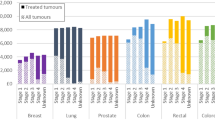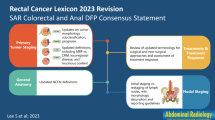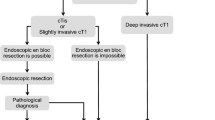Abstract
Background
Previous studies of stage III colon cancer using the hazard function demonstrated that the risk of recurrence in patients with adjuvant chemotherapy never exceeded that of patients without adjuvant chemotherapy. However, it is unclear whether the same can be said for rectal cancer patients and whether adjuvant chemotherapy reduces recurrence. This study aimed to compare the recurrence hazard of stage III rectal cancer with that of colon cancer by adjuvant chemotherapy status using the hazard function, a method that allows for the assessment of instantaneous risk of recurrence over time.
Methods
This retrospective nationwide study consisted of 10,356 patients with stage III colorectal cancer who underwent curative resection between January 1997 and December 2012 in Japan. Recurrence hazards of rectal and colon cancers were compared between patients treated with adjuvant chemotherapy and those who were not. Analyses in which recurrence was divided into local and distant recurrence were also performed.
Results
The hazard rate of recurrence in rectal cancer patients with adjuvant chemotherapy was consistently lower throughout the follow-up period, and the peak time of recurrence later, compared to patients without adjuvant chemotherapy (peaked at 15.7 vs. 7.1 months). Adjuvant chemotherapy also strongly suppressed distant recurrence but not local recurrence in rectal cancer patients. Similar results were observed in colon cancer patients.
Conclusions
Our results using nationwide real-world data in Japan suggest that, similar to what is observed in colon cancer patients, adjuvant chemotherapy delays the peak of recurrence and suppresses distant recurrence in stage III rectal cancer patients.





Similar content being viewed by others
Abbreviations
- CRC:
-
Colorectal cancer
- NCCN:
-
National Comprehensive Cancer Network
- RFS:
-
Recurrence-free survival
- TNM:
-
Tumor–node–metastasis
References
International multicentre pooled analysis of colon cancer trials (IMPACT) investigators. Efficacy of adjuvant fluorouracil and folinic acid in colon cancer. Lancet. 1995;345:939–44
André T, Boni C, Mounedji-Boudiaf L, et al. Oxaliplatin, fluorouracil, and leucovorin as adjuvant treatment for colon cancer. N Engl J Med. 2004;350:2343–51.
André T, Boni C, Navarro M, et al. Improved overall survival with oxaliplatin, fluorouracil, and leucovorin as adjuvant treatment in stage II or III colon cancer in the MOSAIC trial. J Clin Oncol. 2009;27:3109–16.
Hashiguchi Y, Muro K, Saito Y, et al. Japanese Society for Cancer of the Colon and Rectum (JSCCR) guidelines 2019 for the treatment of colorectal cancer. Int J Clin Oncol. 2020;25:1–42.
Bujko K, Glimelius B, Valentini V, et al. Postoperative chemotherapy in patients with rectal cancer receiving preoperative radio(chemo)therapy: a meta-analysis of randomized trials comparing surgery +/− a fluoropyrimidine and surgery + a fluoropyrimidine +/− oxaliplatin. Eur J Surg Oncol. 2015;41:713–23.
Oki E, Murata A, Yoshida K, et al. A randomaized phase III trial comparing S-1 versus UFT as adjuvant chemotherapy for stage II/III rectal cancer (JFMC35-C1: ACTS-RC). Ann of Oncol. 2016;27:1266–72.
Hong YSKS, Lee JS, Nam BH, et al. Oxaliplatin-based adjuvant chemotherapy for rectal cancer after preoperative chemoradiotherapy (ADORE): long-term results of a randomized controlled trial. J Clin Oncol. 2019;37:3111–23.
National Comprehensive Cancer Network (2020) NCCN clinical practice guidelines in oncology-rectal cancer, version 6. 2020
Hess KR, Levin VA. Getting more out of survival data by using the hazard function. Clin Cancer Res. 2014;20:1404–9.
Sargent D, Sobrero A, Grothey A, et al. Evidence for cure by adjuvant therapy in colon cancer: observations based on individual patient data from 20,898 patients on 18 randomized trials. J Clin Oncol. 2009;27:872–7.
Hamada C, Sakamoto J, Satoh T, et al. Does 1 year adjuvant chemotherapy with oral 5-FUs in colon cancer reduce the peak of recurrence in 1 year and provide long-term OS benefit? Jpn J Clin Oncol. 2011;41:299–302.
Ishiguro M, Higashi T, Watanabe T, et al. Changes in colorectal cancer care in japan before and after guideline publication: a nationwide survey about D3 lymph node dissection and adjuvant chemotherapy. J Am Coll Surg. 2014;218(969–77):e1.
UICC. TNM classification of malignant tumours, 8th edn. New York: Wiley; 2017
Kudose Y, Shida D, Ahiko Y, et al. Evaluation of recurrence risk after curative resection for patients with stage I to III colorectal cancer using the hazard function: retrospective analysis of a single-institution large cohort. Ann Surg. 2021; in press
Muller HG, Wang JL. Hazard rate estimation under random censoring with varying kernels and bandwidths. Biometrics. 1994;50:61–76.
Shida D, Tanabe T, Boku N, et al. Prognostic value of primary tumor sidedness for unresectable stage IV colorectal cancer: a retrospective study. Ann Surg Oncol. 2019;26:1358–65.
Shida D, Boku N, Tanabe T, et al. Primary tumor resection for Stage IV colorectal cancer in the era of targeted chemotherapy. J Gastrointest Surg. 2019;23:2144–50.
Rödel C, Graeven U, Fietkau R, et al. Oxaliplatin added to fluorouracil-based preoperative chemoradiotherapy and postoperative chemotherapy of locally advanced rectal cancer (the German CAO/ARO/AIO-04 study): final results of the multicentre, open-label, randomised, phase 3 trial. Lancet Oncol. 2015;16:979–89.
Hess KR, Pusztai L, Buzdar AU, et al. Estrogen receptors and distinct patterns of breast cancer relapse. Breast Cancer Res Treat. 2003;78:105–18.
Cheng L, Swartz MD, Zhao H, et al. Hazard of recurrence among women after primary breast cancer treatment—a 10-year follow-up using data from SEER-Medicare. Cancer Epidemiol Biomark Prev. 2012;21:800–9.
Retsky M, Demicheli R. Multimodal hazard rate for relapse in breast cancer: quality of data and calibration of computer simulation. Cancers. 2014;6:2343–55.
Shah MA, Renfro LA, Allegra CJ, et al. Impact of patient factors on recurrence risk and time dependency of oxaliplatin benefit in patients with colon cancer: analysis from modern-era adjuvant studies in the adjuvant colon cancer end points (ACCENT) database. J Clin Oncol. 2016;34:843–53.
Mejri N, Dridi M, Labidi S, et al. Annual hazard rate of relapse of stage II and III colorectal cancer after primary therapy. Clin Transl Oncol. 2017;19:1524–30.
Tomita N, Kunieda K, Maeda A, et al. Phase III randomised trial comparing 6 vs 12-month of capecitabine as adjuvant chemotherapy for patients with stage III colon cancer: final results of the JFMC37–0801 study. Br J Cancer. 2019;120:689–96.
Maeda H, Kashiwabara K, Aoyama T, et al. Hazard rate of tumor recurrence over time in patients with colon cancer: implications for postoperative surveillance from three Japanese Foundation for Multidisciplinary Treatment of Cancer (JFMC) clinical trials. J Cancer. 2017;8:4057–64.
Fujita S, Mizusawa J, Kanemitsu Y, et al. Mesorectal excision with or without lateral lymph node dissection for clinical stage II/III lower rectal cancer (JCOG0212): a multicenter, randomized controlled. Noninferiority Trial Ann Surg. 2017;266:201–7.
Watanabe T, Itabashi M, Shimada Y, et al. Japanese Society for Cancer of the Colon and Rectum (JSCCR) guidelines 2010 for the treatment of colorectal cancer. Int J Clin Oncol. 2012;17:1–29.
Schmoll HJ, Van Cutsem E, Stein A, et al. ESMO Consensus Guidelines for management of patients with colon and rectal cancer. a personalized approach to clinical decision making. Ann Oncol. 2012;23:2479–516.
Steele SR, Chang GJ, Hendren S, et al. Practice guideline for the surveillance of patients after curative treatment of colon and rectal cancer. Dis Colon Rectum. 2015;58:713–25.
Meyerhardt JA, Mangu PB, Flynn PJ, et al. Follow-up care, surveillance protocol, and secondary prevention measures for survivors of colorectal cancer: American Society of Clinical Oncology clinical practice guideline endorsement. J Clin Oncol. 2013;31:4465–70.
Acknowledgements
This study is based on data from 24 hospitals, which are members of the Japanese Study Group for Postoperative Follow-up of CRC, as follows: Ichiro Takemasa (Sapporo Medical University); Kenichi Hakamada (Hirosaki University); Hitoshi Kameyama (Niigata University); Yasukimi Takii (Niigata Cancer Center Hospital); Hideki Ueno (National Defense Medical College); Heita Ozawa (Tochigi Cancer Center); Soichiro Ishihara (the University of Tokyo); Keiichi Takahashi (Tokyo Metropolitan Cancer and Infectious Diseases Center Komagome Hospital); Yukihide Kanemitsu (National Cancer Center Hospital); Michio Itabashi (Tokyo Women’s Medical University); Tomomichi Kiyomatsu (National Center for Global Health and Medicine); Yusuke Kinugasa (Tokyo Medical and Dental University); Koji Okabayashi (Keio University); Yojiro Hashiguchi (Teikyo University); Tadahiko Masaki (Kyorin University); Masahiko Watanabe (Kitasato University); Akio Shiomi (Shizuoka Cancer Center); Tsunekazu Hanai (Fujita Health University); Koji Komori (Aichi Cancer Center Hospital); Yoshiharu Sakai (Kyoto University); Masayuki Ohue (Osaka International Cancer Institute); Shingo Noura (Osaka Rosai Hospital); Naohiro Tomita (Hyogo College of Medicine); and Yoshito Akagi (Kurume University).
Funding
None.
Author information
Authors and Affiliations
Consortia
Corresponding author
Ethics declarations
Conflict of interest
The authors declare that they have no conflict of interest.
Additional information
Publisher's Note
Springer Nature remains neutral with regard to jurisdictional claims in published maps and institutional affiliations.
Supplementary Information
Below is the link to the electronic supplementary material.
Rights and permissions
About this article
Cite this article
Ahiko, Y., Shida, D., Kudose, Y. et al. Recurrence hazard of rectal cancer compared with colon cancer by adjuvant chemotherapy status: a nationwide study in Japan. J Gastroenterol 56, 371–381 (2021). https://doi.org/10.1007/s00535-021-01771-6
Received:
Accepted:
Published:
Issue Date:
DOI: https://doi.org/10.1007/s00535-021-01771-6




